#that some of our weaknesses can be our strength when viewed from another point of view
Note
Firstly, when you get this, you have to answer with 5 things you like about yourself, publicly. Then, send this ask to 10 of your favorite followers (non-negotiable, positivity is cool)
oh dear lord
ughhhhh, well:
1. i like my taste in music ig? lol, an obvious answer, but seriously. i'm especially proud of how in the recent couple of years i've been trying to listen to more new (for me) music, instead of listening to the same couple of artists over and over again 'till i'm sick of them lmao. i still have lots and lots to discover, what i listen to is not as diverse as i would like etc. etc. but i'm getting there! no point in rushing this, it's not a competition x) (i recently stumbled upon a post from 4 years ago, where i was asked to list my 9 favorite albums, and... let's say there's been a lot of improvement, that list is vile lmaoo)
2. feels kinda douchey to admit this, but i like my art. it's not perfect obviously, and i have a lot yet to learn, but i enjoy what i'm able to create. there is a lot of frustration from time to time, of course, but i wouldn't do it if i didn't enjoy it, would i?
3. i think i'm a pretty approachable, peaceful person, sometimes too kind for my own good. i'm patient with people and don't seek confrontation. it has it's own downsides sometimes, because i'm also a huge people pleaser, but i'm working on finding a good balance between kindness and knowing when to tell someone to fuck off lol
4. running out of thoughts, hm... maybe my perfectionism? i usually hate it and it brings me a lot of frustration and anxiety, but i guess it can be a good thing sometimes, too. if someone asks me to help them out with something, i'll try to do my best? maybe that, idk
5. and as the last thing here's something a lil bit more vain: i like my body :} i might be not so happy about my face from time to time (though i like it more often nowadays than not. we're stuck together forever so it's not like there's any choice but to learn to appreciate it for what it is lol), but at least i'm happy with my physique!
#this turned out to be way longer than i expected oops#you can tell how i've been lonely lately by the length of this post lmaoo#feels incredibly awkward to talk about myself in positive light#but that's the point so thanks for this!#step by step little by little we'll learn how to accept us for what we are#that some of our weaknesses can be our strength when viewed from another point of view#easier said than done though..#ok i'll stop right there or i'll never shut up#tags; asks; etc.#<- i hope i won't forget this one later
2 notes
·
View notes
Text

The power of vulnerability: embracing assistance
Accepting help can be a challenging yet transformative experience. Whether it's a helping hand from a friend, support from a colleague, or guidance from a mentor, learning to accept assistance is an essential skill that fosters personal growth and development.
Overcoming pride and fear
One of the biggest barriers to accepting help is pride. Many of us hesitate to admit when we're struggling or in need because we fear appearing weak or incompetent. However, acknowledging our limitations and seeking assistance is not a sign of weakness but rather a demonstration of strength and self-awareness.
Fear is another factor that often holds us back from accepting help. We may worry about burdening others, fear rejection, or feel uncomfortable with vulnerability. It's important to recognize that everyone needs help at some point in their lives, and reaching out is a natural part of the human experience.
Embracing vulnerability
Accepting help requires vulnerability, as it involves letting down our guard and allowing others to see us in our times of need. However, vulnerability is not a weakness but rather a source of strength. When we open ourselves up to receiving help, we create opportunities for deeper connections and meaningful relationships.
Recognizing support systems
Building a support network is crucial for learning to accept help. Surround yourself with people who genuinely care about your well-being and are willing to offer assistance when needed. Whether it's friends, family members, mentors, or colleagues, having a reliable support system can make it easier to reach out for help when necessary.
Communicating needs effectively
Effective communication is key to accepting help. Clearly articulate your needs and boundaries to those offering assistance, and don't be afraid to ask for what you need. Be open and honest about your challenges, and don't downplay or dismiss the support offered to you.
Cultivating gratitude
Gratitude is a powerful practice that can help shift your mindset towards accepting help. Instead of viewing assistance as a sign of weakness, see it as a gift from others who care about your well-being. Express gratitude for the support you receive, whether it's through a simple thank-you or a heartfelt gesture of appreciation.
Embracing growth and independence
Learning to accept help is not about becoming dependent on others but rather about fostering growth and independence. By recognizing when you need assistance and reaching out for support, you empower yourself to overcome obstacles and achieve your goals. Accepting help is a courageous act that demonstrates your commitment to personal development and self-improvement.
In conclusion, accepting help is a valuable skill that requires vulnerability, effective communication, and gratitude. By overcoming pride and fear, building a support network, and embracing growth, you can learn to accept assistance gracefully and navigate life's challenges with confidence and resilience.
12 notes
·
View notes
Text

Still have those Nerevarine Taylor Hebert brainworms. The more I think about it and trawl through UESP, the more the coincidences and thematic parallels jump out at me. Sleep-deprived ramblings and massive spoilers below the cut.
Starting off, y'know how Gold Morning wraps up on June 24th? Let's see if that date has any significance on Nirn:

Oh, okay. So, she suddenly appears in the dungeons beneath the Imperial City on Tiber's Day. Y'know, the day celebrating the Dragon Emperor. That might be relevant for the prophecy stating that the Nerevarine is "Dragon-born and far-star-marked." It also casts some iiiinteresting parallels between her and old Talos Stormcrown.
How about being born under a certain sign? Well, Taylor's birthday is canonically in June/Mid Year, which corresponds to the Steed constellation. Nothing too special there, right?
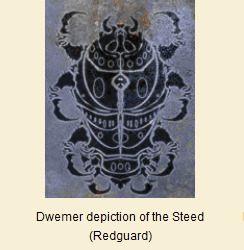
Ah. Hm. The Dwemer, who are kind of a big deal when it comes to the plot of Morrowind, represented the Steed as a scarab. As you may recall, Taylor once rode a giant scarab beetle (best boy Atlas) as a steed. And, y'know, Khepri is a scarab-headed god in Egyptian mythology. The scarab imagery also appears repeatedly in the metaphysics of The Elder Scrolls, in things like the Thirty-Six Lessons of Vivec and the Mythic Dawn Commentaries. It also appears in Kirkbride's Notes on the Psijic Endeavor and Loveletter from the Fifth Era. This bears further inquiry.
The Psijic Endeavor is "a process by which mortals are charged with transcending the gods that created them," which sounds awfully familiar to those familiar with the ending of Worm. It formed the basis of the teachings of the Prophet Veloth, who led the ancient Chimer to the land of Morrowind. Its rules were taught to him by the daedra Boethiah, Mephala, and Azura. These are the "Three Good Daedra" revered by the Dunmer of Morrowind. In the Tribunal faith, they are seen as the Anticipations of the living gods Almalexia, Vivec, and Sotha Sil. But they also can be viewed as parallels of another.
Boethiah is the Daedric Prince "whose sphere is deceit and conspiracy, and the secret plots of murder, assassination, treason, and unlawful overthrow of authority." It is not a stretch to call him the Anticipation of Skitter, the thief-turned-warlord.
Mephala is known as The Webspinner, who taught the Dunmer "meticulous plotting and how to lie, ways to lure and trap our foes, how to manage complexity and predict outcomes." They are the Anticipation of Weaver, the scheming hero.
Azura is the Prince of Dusk and Dawn, and is "associated with mystery and magic, fate and prophecy." She is the Anticipation of Khepri, champion of the prophesied Gold Morning.
At this point, it's probably worth mentioning that the Tribunal, living god-hero-kings of Morrowind, first became such and usurped the Good Daedra in Dunmeri culture by siphoning power from the heart of a god. Meanwhile, the Triumvirate, the greatest heroes of Earth Bet, got their powers from the flesh of a dead Entity. And both trios concealed the nature of their power in order to present an image of unassailable strength, even as they grew fractured and weak. What a fun parallel!
Still, we're not here to talk about the Tribunal and the Triumvirate. Who cares about them? We're here to talk about Taylor Hebert, Lorkhan, and why Taylor is OBVIOUSLY a Shezarrine.
No, seriously, bear with me. Okay, so, Lorkhan (whose severed heart is at the root of the whole plot of of Morrowind) is said to walk the world of Nirn in mortal form. This mortal incarnation, the Shezarrine, appears in times of great need, "gathering armies, conquering lands, ruling, then abandoning his kingdoms to wander again." Famous appearances of the Shezarrine include Pelinal Whitestrake, Ysmir Wulfharth, and Tiber Septim. Yes, that Tiber Septim. The one upon whose day Taylor defeated Scion with a jury-rigged jailbroken superpower. The one who jury-rigged the soul of a Shezarrine into a power source for a weapon meant only to be powered by the physical heart of Lorkhan and used it to conquer the world.
Now, it might be a bit of a stretch to say that Taylor Hebert, parahuman teenager from Earth Bet, is the mortal incarnation of the Missing God. And yeah, she probably wasn't during the events of Worm. But in the metaphysics of The Elder Scrolls, there's this thing called mantling, wherein one can assume the role of another by "walk[ing] like them until they must walk like you." Essentially, one so closely emulates another being until the two are indistinguishable to the world at large. This is arguably what the protagonist of Morrowind does during the course of the game; by deliberately setting out to satisfy the conditions of the Nerevarine prophecies, they walk like the Nerevarine until they ARE the Nerevarine. And Taylor? Well, she's already done a LOT of walking like a Shezarrine.
Remember that bit about the scarab imagery earlier? Yeah, well, Lorkhan is explicitly called "the Scarab" in The Thirty-Six Lessons of Vivec, Sermon Ten. The Psijic Endeavor? Though spread by the Daedra, its originates from Lorkhan. He saw the whole of creation from a sideways angle, and sought to teach others so that they might one day do the same and "transcend mortal boundaries set in place by immortal rulers."
Scarab-headed Khepri transcended the limits imposed on her power, saw the whole of existence by way of the Clairvoyant, and raised an army of mortal parahumans to overthrough the "god" that made them. Her work done, she abandoned her kingdom to go wander again.
Anyways, I hope this was at least somewhat coherent for something written after an all-nighter of playing a twenty-year-old video game and diving deep into the UESP wiki and The Imperial Library. There are a fair few more things I wanna talk about, like how the daedra of the Four Corners of the House of Troubles tie into Taylor's journey in Worm, or the parallels between Scion during Gold Morning and the Numidium during C0DA, but I reeeeaaally should go sleep now.
To close things out, here's a pic of Taylor learning about all this mythic prophecy bullshit from Nibani Maesa, Wise Woman of the Urshilaku Ashlanders:
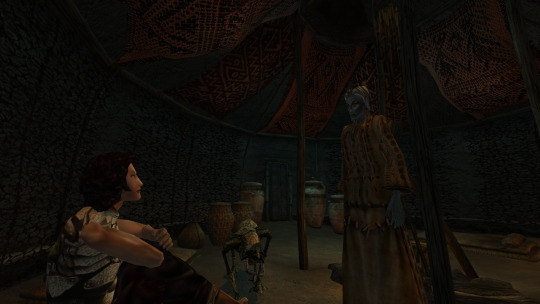
7 notes
·
View notes
Text
My brain and language. Why I think some brains are more affected by autism than others.
I don‘t think one person is more autistic than the other. An autistic brain is an autistic brain. But the thing is, the way autism affects your brain is different. The intensity in which it is affected by autism is different. That‘s why we have different support levels, that‘s why some people go their whole lives with an invisible disability and some don‘t.
I will talk about my speech and language first. I don‘t have speech apraxia or any other physical condition that affects my speech. My speech issues are many. I have issues with prosody, tone, fluency. On top of that I also have language impairment. Language impairment is, for example, when someone cannot process grammar the same way people without language impairment do. As a kid, I didn’t understand what was being said to me. I literally didn’t process language. This still happens to this day. I have a lot of difficulties with reading and listening. I simply don’t process it as quickly as others. Scientists haven‘t been able to understand exactly why this happens.
Another funny thing is that sometimes I make mistakes on my native language that natives shouldn‘t make. But while learning a new language, I can memorize and understand grammar rules quite easily so I don‘t have the same mistakes on the languages I study. We know the area of the brain that learns a native language is different from the one that learns a second language. So my brain has been affected more in one area of these two, which is why I can learn languages even with impairment of language. I cannot process speech and text at the same speed as others, but I can learn grammar rules and store them in my brain. But when speaking my own language I make mistakes, because it’s not about memorizing rules and it’s about a language that I don’t know the rules of, that I just have to intuitively „guess“, but because of my impairment, I can’t do it normally. Which also shows how autism is affecting this area of my brain specifically.
These issues are not separate from autism. They are caused BY my autism. They are a part of my autism. Autism has affected the communication area of my brain more severely than other autistics‘ without these issues.
See the brain, picture the areas of a brain in your mind. Most of people, NT people have all areas almost equally functioning. They might be more or less verbal or logical. But all within a normal range.
Now picture an autistic brain. Our „scores“ on such testing will have a different scale because some areas of our brains are not functioning like an NT or like other people with ADHD or other conditions.
Now picture my brain. My brain does not only score low on language processing for an NT. It also scores way lower on ASD scales. This area of my brain is more affected by autism than other autistics.
It‘s unusual to see really huge differences on a brain (therefore Savant Syndrome is so rare). So other areas of my cognitive profile will also score lower than someone with ASD level 1. Some areas of my brain are not so affected to the point of causing a disorder, such as my language and speech area. But they are still usually affected a little bit more than on an ASD scale. Some of those areas are within a normal range of what is normal for an autistic person. Some not, some are lower. This is the reason why I am diagnosed with level 2. not level 3. not level 1.
Of course, all people have strengths and weaknesses, all people within the spectrum will have different areas affected on a different scale. But most of the time there is a pattern.
This is why it makes me so upset when people dismiss levels, this is why it makes me upset when people say they have different levels everyday. This is why you don‘t „go nonverbal“ when the language area of your brain is completely fine.
I hope I was able to explain myself clear. This is my view and this is how I understand autism based on my own experience and research about brain and cognition. Please when reading remember I have a communication disorder if you need clearance ask and be kind.
19 notes
·
View notes
Text
PAC Reading: The Chariot
The Chariot talks about willpower, drive, and taking the reins in your own life. It's having a balance between creativity and logic, using both to go after your goals. What parts of yourself do you need to harness to achieve your goals?
This reading is for entertainment purposes only and is not a substitute for professional help in any capacity. Remember your choices are all your own, use common sense, and don't be a dumbass.

Pick one of the Sphinxes or the lil white square on his chest and head to your pile


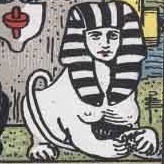

Sphinx One
Y'all seem to be avoiding deeper emotions. For some of you, it's just emotions entirely. It's not even that you're avoiding negative or 'bad' emotions. You're also avoiding the things that can bring you a deeper sense of joy. I think it's genuine emotion that you're avoiding. Y'all seem to have this view of emotions that they're irrational, soft, weak and I'm hearing gross, so I guess for at least one of you emotions are gross. The one that is being pushed the most though is thinking being emotional = being dumb. I'm seeing this example of someone who judges someone for something, then they go and do it in secret. You may be the type to deprive yourself of something in the name of being 'rational'. Now, the way it's being shown to me is that you are going SO damn far avoiding emotions that you're being more illogical now then you would have been if you just let yourself FEEL. It's gotten to the point that being 'logical' is costing you. It's like you see being unemotive as a strength? Listen, the strength is understanding when and how to communicate your emotions. Not just avoiding them. Because let's be honest here, you feel emotions. You're just running from them. You think that if you keep pushing them away and pushing them down you'll somehow reach a point where you're okay and you just don't have to deal with them. Babe. You want to be happy, you want to FEEL happy. We all do. And that's the thing. You're trying so so fucking hard to convince yourself that you don't want things and you don't need/have emotions but you do. You want to be loved (platonically or romanticly). You want to do things that make you feel things. You do all this shit to prove to yourself or others that you're strong, but babe, you are strong, you have nothing to prove. The Chariot is all about combining two opposite things together and using them to move forward. What it's here to tell you is that you CAN be both emotional and rational. They aren't even opposites, you just think they are. Emotions are another way our body and subconscious communicate with us. Emotions tell you what you think in a lot of ways. You feel happy? You think something is nice or good. You feel sad/angry you think something is wrong. Now, that doesn't mean what you think/feel is always right, you can and will misunderstand situations. We all do. But condemning yourself for feeling something? For laughing when you're happy? Or crying when you're sad? Is not helping anyone. I'm serious. Tell me who are you helping by not letting yourself be happy or sad? Who the hell could benefit from that? Because it certainly isn't you. The Chariot is here saying to achieve your goals. to live your life and own it. You have to let yourself feel it.
Random ass vibes: Sun, spend some time in nature. globes, yellow flowers, a lot of yellow here, Leo, 777, dancing,
Two

The lil Square
Y'all seem to be actively avoiding your potential. I think some of y'all know this and others may not. Y'all see going after what you want as rocking the boat for some reason. You may be in a situation where letting yourself embrace your potential will make someone else insecure, make others mad, or you feel like they'll judge you for what you're good at. There's a bit here about seeing your true potential for what it is as being egotistical or arrogant. Honey, I'm here to tell you it's not. I promise. Why are y'all judging yourselves for what you're good at?? There are enough people in the world who will judge you for shit, you don't need to do their job for them. You seem to think that if you pick at yourself before others can, you'll catch every flaw or you'll be able to handle criticism better. That ain't how this works. Because A: most 'flaws' people pick at are more about preference, what one person hates about what you do others will love you for it. B: You end up breaking yourself down before you even get started because you're soo focused on the 'flaws' that you don't see the awesome parts. And C: You end up fitting yourself into a model that is palatable to everyone and lose what you liked about it in the process. It's impossible to be liked and approved of by everyone. You seem to be soo focused on all you're not good at and just dismissing what you are good at. Babe, you need to reverse that. Own your strengths. If others don't like that they can go fuck themselves. There's a bit here about comparing yourself and being afraid of competition. Here's the thing about that though: Yes, there will be people better at whatever you're trying to do. BIG BUT HERE (haha), that does not take away from your strengths. It doesn't. Someone else being good at something doesn't make you bad at it. A rose is good at being a flower, but that doesn't mean a sunflower is bad at it. That being said, YOU CAN BE 'BAD' AT SOMETHING. THAT IS OKAY. YOU CAN DO SOMETHING TO JUST DO IT. YOU CAN DO IT JUST FOR YOU. YOU DON'T HAVE TO BE GOOD AT SOMETHING TO JUSTIFY DOING IT. GETTING JOY FROM DOING IT IS REASON ENOUGH. There's an underlying message here about jealousy and letting others do things that they enjoy badly. See, when we judge ourselves for something, we usually end up judging others for it. Everyone does this to some extent, we're human after all. The advice here is to let yourself just be and do and not judge yourself for it. That will reflect outward towards others. As above so below, as inward so outward. When you feel safe enough with yourself to let yourself reach your potential fully AND openly be bad at some things, others will feel safe enough with you to do the same.
Random ass vibes: camping, bugspray, sunglasses, 13, Cancer, art, perfectionism, doritos, swimming, drink some water, Virgo

Sphinx Two
Y'all came through strong, y'all may have some intuitive abilities going on here. You seem to have this fucked perception of yourself and your intelligence. You seem to be more emotional, maybe even consider yourself sensitive. What I'm seeing is that you may think that means you lack judgment or rational thinking. And that embracing your more logical side means losing your emotional intelligence. (the other sphinx group had the exact opposite issue, which is kinda cool cause one sphinx is meant to represent logic and the other emotion, and the chariot brings them both together) You may have been taught to believe that being sensitive means being weak, and means you lack intelligence. Which we know is bullshit. You seem to take it one step further though and avoid things that require you to use your mind. Y'all seem to feel like you just can't do things, can't make decisions because you can't trust your judgment. Maybe people have talked to you that way so much that you've started to believe it. Well, fuck that. YOU ARE SMART. YOU ARE CAPABLE. You absofuckinlutly can be emotional AND smart. It's okay to feel things deeply. It's okay to be sensitive. You need to understand that there is more to you than that though. You're not stuck with one singular trait. You can be a motherfucking badass and cry during sad movies, or happy movies for that matter. Y'all seem to have been put in this limiting box, whether by yourself or others or society it doesn't matter. What matters is you saying fuck it and embracing every side of yourself. The emotional side. The confident side. The smart side. The shy side. The brave side. The scared side. The wild side. The tame side. You are a full, complex person. We all are. You're limiting yourself by keeping yourself in this box. You don't have to maintain this easy-to-grasp personality for the people around you. Yea, they may not be able to handle the full complexity that is you but that's their problem. Complex doesn't mean bad. Each and every one of us is full of complexity and contradictions. We're human. I keep hearing 'they'll think it's weird'. Sweetheart, does that really matter? I'm serious. Some people think tarot is weird and here we are. Even the roughest opinions are just that, opinions. (Y'all may want to read the second pile's reading, it may help you.) No matter what you do, someone somewhere will have a problem with it. Are you really going to let that stop you? You really are going to deprive yourself of something awesome purely because someone else (who doesn't give a shit what you think of them) will be whiny about it? No offense babe, but I think you need to reevaluate your priorities.
random ass vibes: juicy fruit gum, 11:11, legally blonde, reading, doves, hockey, angels, 22,
#tarot readings#Spotify#tarot deck#tarot reading#tarot cards#tarot#tarotblr#divination#free tarot#tarot reader#pac reading#pick a pile#pick a card#the chariot#pick a card reading#pick a photo
174 notes
·
View notes
Text
Season 1 retrospective part IV: ReArise's resident edgelord: Hiragii Takumi.
Takumi is, simply put, an ass. He's very much the jerk-with-a-heart-of-gold type, but his writing has enough texture and facets to make him fun to follow (extra emphasis in fun, given how season one's uneven pacing lends some hilarity to his arc).

[Image id: Screenshot showing Dorugamon Takumi with his arm extended forward and his hand outstretched. He's frowning gravely and his dialogue reads "You're the strongest Digimon. Let's go prove that to them."]
The weight of the world on your shoulders.
Upon meeting Takumi in the train wagon, one thing is clear: he's rude. While he will say things like "Don't get in the way" and "We're fine on our own", there's also another thing he will consistently repeat through the first act, the third, the first library incident and even as far as act 10, that is— that Digital Points are dangerous and you ought to stay away from them. His prickly attitude is both rooted in pride as well as a genuine belief others aren't equipped to deal with such dangers; whether because they're weak or don't have enough mental fortitude. He bluntly says as much to Herissmon, Michi and Mayu multiple times. Thus, he constantly declares that Dorumon and him will handle the issue alone and you should all go home. Or, alternatively, he'll silently judge you for your decision to get involved, even as he disguises it by dismissively telling Dorumon "Let them do what they want".
The fact he acts out of a sense of responsibility and rightness to deal with what others can't is pointed out through Mayu's act-10 assertion that he will help people in need. Takumi, of course, disregards her remark and questions her abrasively. This is because Takumi hates softening his words for the sake of saving face, and for him it's more important the others realize they're out of their depth than being nice. He values direct, truthful feedback even if he errs on the side of "brutal honesty".
More than acting for the sake of being good to others, Takumi takes on the responsibility because he's the one with power and means to do so. This is outright confirmed by his remark during the fight against Chaosdramon about how only he and Dorumon should be the ones to face the risks—as well as them alone having to face the consequences should they fail to rise to the occasion.
Strength and Independence.
During act 3, Takumi declares he and Dorumon aren't like the others, which is evidenced through the fact Dorumon can evolve. When in a rough spot, Takumi's mantra is that they're the strongest and can tackle anything that comes their way. His iron-fisted, unwavering confidence to tackle difficult situations, alongside his obstinateness, are arguably his chief traits. It's clear Takumi values strength as means for independence, which often puts him at odds with the others. He values being able to solve the challenges before him on his own as proof of his own capacity and power. This recursive and mutually strengthening nature to his values is the source of his fortitude and certainty over himself, which makes him extremely reticent to accept the others or act as a team.
Even so, he gradually starts recognizing the Tamers' mettle and seeing the value in acting together as a team as the threat the Spirals pose keeps on growing and exceeds their individual capacities, as evidenced through acts 10 to 13. This fraught, budding trust in the others runs face first into his pride and well-hidden fears. If there's one good thing about Keito being the first one to unlock the perfect stage is that it shook Takumi's confidence in himself. Takumi's self-assuredness over his own capacities is tied to his view of himself as the strongest/best, so we get to see a spark of envy and insecurity when this notion is challenged.
Dorugreymon's debut act is marked by Takumi's regression to his lone-wolf behavior, even more over-the-top now he's pushing his partner past what's reasonable. Perhaps shockingly, the fact they both double down on this attitude is what triggers the perfect evolution. This makes sense because it's a reaffirmation of their sense of self and values, but it's a little hilarious that their regression in behavior seems partly rewarded in this act. Still, Dorugreymon's brief remark that this wasn't done solely for their pride but also out of genuine worry over Herissmon's rampaging and their desire to be able to handle the situation should it arise again is a nice touch all the same.
Sunken cost fallacy.
Still, Dorugreymon's evolution act left the most troubling aspects of Takumi's behavior unaddressed — that is, his overconfidence and absurdly aggressive independence being reckless and harmful. While the pacing makes Gaiomon's debut feel jarring given Dorugreymon just evolved literally two acts before it, and the repetitiveness to the scenario (Takumi stubbornly pushing his partner past what's reasonable and insisting on acting alone) can make Takumi appear as though he ping-pongs back and forth too much during his development, it's still nice to see him get his first real wake-up call about how inconsiderate and ill-advised his behavior is with death appropriately looming over Dorugreymon.
Watching Takumi get grilled by everyone is equally satisfying. It's also important for him to accept others' feedback of his actions in order to get pushed to do better. Gaiomon is the perfect ultimate evolution for him, given how driven he is by his quest for strength and self-reliance. It's also nice to see his steely moral abiding shine through in a positive light.
This last stretch, with his perfect and ultimate evolutions, but also his reluctance to leave the town to its luck during the finale—even if he needs to join the others to help contain Rasenmon fury mode—give nice depth to his character, adding something more to his edgelord behavior from earlier in the season beyond tropey behavior. His constant, self-destructive insistence to deal with his issues alone fueled by his strong values hint nicely to his tendency to fall into Sunken Cost Fallacies and his struggle to form an equal, considerate partnership with Dorumon, which are flaws season two exploits nicely.
#digimon rearise#Takumi Hiragii#Meta#Mine#Season 1#Season 1 retrospective#I love charas deeply driven by their values — especially when they make them worse ppl lmao
10 notes
·
View notes
Note
Hey there! I’ve got a bit of a meta question for you. How do you feel about the differences between artistic intention versus the reader interpretation? You’ve been getting a lot of questions about ableism in your story, especially coming from Vicious and Jasper, so I was wondering how you felt about readers interpreting their actions in this way. Before I started regularly reading your explanations and analyses on here, I admit that my understanding was that Vicious and Jasper were ableist; they both used Hope’s disability to try to make her feel small or incapable, with Vicious using it as an excuse to infantilize her and Jasper using it as justification to verbally abuse her. But, as you said, they’re not only abusive to Hope - they’re abusive to their other family members as well - which shows that they would’ve abused her regardless of her disability. I just think it’s possible for both of these interpretations to exist concurrently: that Hope’s parents are abusive to all of their children and prey upon different things for each of them (unrealistic expectations for Adamant, ignoring Quiet, naming Careful’s cubs mean names), but for their abuse of Hope specifically, they attempted to target her disability as a perceived point of weakness. They’re not abusing her because of her disability, but because they’re abusive and she has a disability, they attack it or try to justify their behavior with it. And obviously, we see that this view is not normal in the world and that other lions do not share it - which is further emphasized when Edge calls Jasper a fool for not seeing Hope’s potential and strength - and maybe Hope can gradually shake off her parents’ awful words as she sees more of the world and realizes that the way they treated her wasn’t normal and most lions will not treat her like that just because she’s missing a leg. All of this rambling aside, I guess I’m asking if it bothers you that readers might still read those early chapters without your additional commentary and come to the conclusion that it’s ableism? Sorry this is so long, and I hope I didn’t say anything to offend!
There's nothing wrong with having reader interpretation but if the interpretation is outright incorrect or inaccurate and doesn't line up with what we aim to get across, we do feel it's best to clear things up and correct things here and there.
If things were truly like what you describe with how some readers respond to Hope's abuse: that would be quite fine. You've absolutely nailed it. However, that's not what we've consistently encountered.
Because Jasper and Vicious are ableist towards Hope (because they're not very nice people), some readers have taken that as a cue that ableism is an everyday, normal part of the society of our lions despite evidence to the contrary pointing out that it's not.
Because too many people still assume we're doing "My Pride but better". And to be honest: that's when it bothers us.
When we say we don't want to be "My Pride but better": we mean it. We're also at a point now what we've had to repeat ourselves for nearly three years, the differences between both sets of media are now very apparent and yet we're still where we're at. I don't think y'all can blame us for being 110% done. lol
Because here's the thing: we found that My Pride's society and worldbuilding is such a convoluted, contradictory mess that we don't want to touch any aspect of it with somebody else's barge pole. It's another reason why we ditched the AU idea and started up our lore and worldbuilding completely from scratch.
You also don't always need an abusive, oppressive society to represent abuse and oppression. You can do allegories like that with individual characters and we've also found it's more effective to dismantle this kind of thing when contrasting said individuals with other individuals (i.e. Jasper vs Obsidian, Edge vs. Jasper and so on).
So, to sum it up: reader interpretation is fine but if your whole interpretation hinges on the comic "being a better My Pride" discourse and drawing up comparisons between the two, then yeah, we're gonna just have to say no on that one, I'm afraid. - RJ
18 notes
·
View notes
Text

Enjoying an assignation or two at Comic-Con is always a glorious game of chance. Sifting through the wizards and elves is easy enough, however finding the age appropriate Storm Trooper from the original trilogy with a ‘thing’ for Princess Leia is almost a forensic endeavor. Dressing for the success you crave is part of the fun. Cosplay isn’t complicated for those with dedication and a rich fantasy life. Sending the right message is a bit more nuanced. I have made some alterations to her heavy floor-length robes by flimsifying the material with a sheer babydoll skirted negligée’, shortened to show off my long legs and barely covering my thonged derriere. The low-cut front reveals a front-clasped balconette bra to enhance the plump firmness of my breasts and tease a view of my rouged aureolas. I add white thigh-high stockings and platform stilettos to send a subliminal insistence the emphasis is on ‘play’ in this costume. To drive home the point, I accessorize with dark ebony ropes of my choosing. They depart from canon, but I want to be prepared to get the party started.
As you can see, after a brief encounter in a stalled elevator where I couldn’t resist a Sith Lord’s obsession with kissing my peekaboo nipples, I have been abducted from a Yoda Keynote by an especially authentic player and escorted back to his hotel suite. He cocked his helmeted head when he saw me, all blushed and fresh from my dalliance with the dark side and made a bee line across a wide hallway. After relieving me of the ropes draped on my shoulder, he grasped my hand and murmured a few promising promises in a deep adult voice. I brought his gloved hand to my cleavage to feel my heart pounding in my chest and nodded in surrender to his charming mystery. Hoisting me over his shoulder for dramatic effect, his gesture was cheered on by those standing in line… or for my equally deserving exposed rump. Our ride down a freight elevator was punctuated by few well-paced spanks to establish the dynamic and I responded with a yelping gratitude, but little resistance. I could hear his chuckle of arousal and anticipation beneath the mask and squirmed to test his strength and resolve to maintain his dominance. I was not disappointed and wondered if I had hit the jackpot. He swiftly tied me up with the prowess of an Eagle Scout, proving this was not a freshman outing for him. My questions were hushed with a single finger to my lips as he worked to isolate my movements. Unclasping my bra he freed my throbbing breasts from it to nuzzle between them and inhale the musk of my fragrance. Still unknown beneath his mask, I reveled in the smooth curves of the white ABS plastic against my flesh. In keeping with his character, he became a bit rough with me… then suddenly snapped to attention to greet another Storm Trooper entering. This was not just any vanilla version, this was Captain Phasma herself. I could see my shocked expression reflected in her chromium armor as she approached me.
“Am I interrupting anything?”
“No, Captain, I found her for you … and subdued her for interrogation.”
“How thoughtful, a sexy little Princess. Nice work, soldier. You deserve first crack at our little hostage… while I watch.”
“As you wish Captain!”
I’m familiar with staying in character at these Cons, and it tempts me to defiantly fight back with typical Leia snark. Instead I stay silent and choose to watch this power couple perform. They don’t seem to mind as they’re so deep inside the characters I am just another living prop. He takes orders from her throughout the ‘interrogation’ and she marvels at my sexual responses. No one takes off their costume, so I am treated to being caressed and stimulated with various toy weapons, but the real flesh and blood people are never revealed.
When she steps in after a particularly galactic climax renders me weak and quivering, she whispers words of encouragement and asks for consent for her impending contributions. I’m intrigued and aroused by my first opportunity with another woman… not to mention one dressed as an Imperial Captain. He blindfolds me to preserve her identity and I can hear her removing her helmet. She is chatty, but twists the character off-book to suit her obvious desires. She wants to hear my confession of crimes against the Empire, while she torments me with pleasures… relentlessly. Her partner is commanded to reconfigure my bindings until I’m spread-eagle on the four poster bed. I do my best to maintain the make-believe dialog of a sassy detainee, but when she lavishes me with tongue kisses along my drenched folds I know I am in the hands of a master mistress. Stammering with aroused lust, I whimper in acquiescence and open myself up to her delicate finger probes. She enlists the helpful trooper to join in with kisses and caresses while she delves deeper with her own pleasure-seeking agenda. The sound of something buzzing is applied to my swollen lips then eased inside me for full effect. The sensations are intense and the subtle plunging in and out sends me into a heightened state of desire for more of this deep and delectable ‘torture’.
Taking her cue from my crazed pleas, she excuses herself and barks new orders to…
“Prepare her for me!”
Bindings are undone and my blindfold is removed before I am bent over and re-secured to a tall padded stool in front of a mirror. I am gazing at my sex-crazed face and the trooper tidying up my hair buns, delivering a few intermittent spanks to keep me dazed & amused. Being a Star Wars devotee, I am in a bliss state from the sight of this quirky fan fiction tableau. When the re-helmeted Phasm walks in sporting a strap-on, gleaming to match her armor, I am beside myself with the vision of the two of them towering behind me. I am soon being entered and stretched by her attachment and groan with every joy I am capable of uttering. I watch my reflection surrender to it with eyes rolling back in my head and a gratitude I have never experienced. The circumstances have ruined me for anything less and the approaching orgasm may actually kill me, but as a true fan, I welcome this peak Death Star experience. When the sound effect of a swooshing light saber is introduced into the mix, I cum with a velocity that transports me to a galaxy far, far away.
4 notes
·
View notes
Text
Doodles for fanfiction part 4 ヾ(=`ω´=)ノ”
I had a bit of trouble drawing some of the attacks so it took me so long to draw them 😂
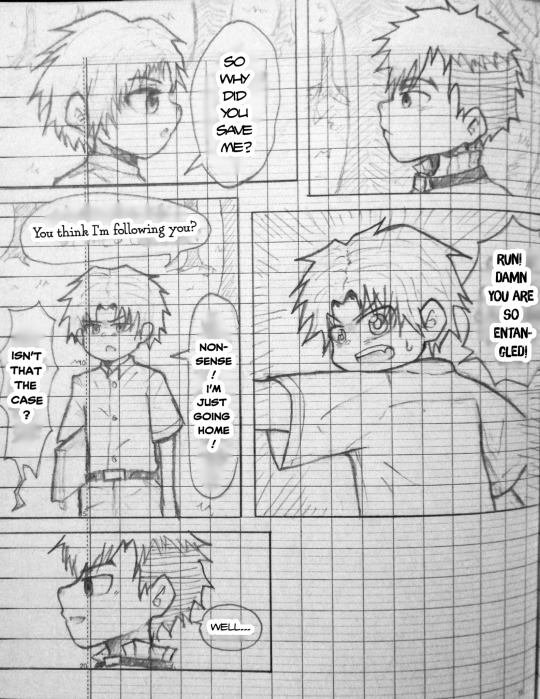
When attacked by Hyakuyas, Guren risked his life to protect Kureto because he thought Kureto was a normal child, and because he felt responsible for implicating Kureto, Guren know that he was their only target.
And Kureto liked that courage and kindness of Guren, so he didn't want this child to die.

...However, he will never admit it.
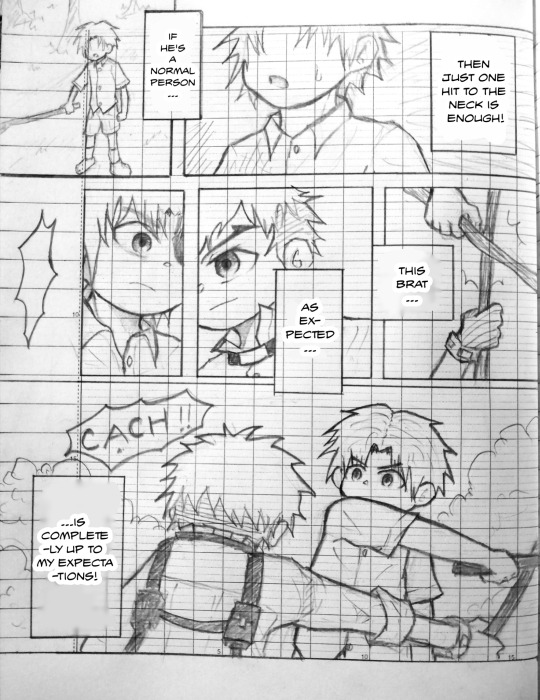
Guren was able to block that lightning attack.
And...
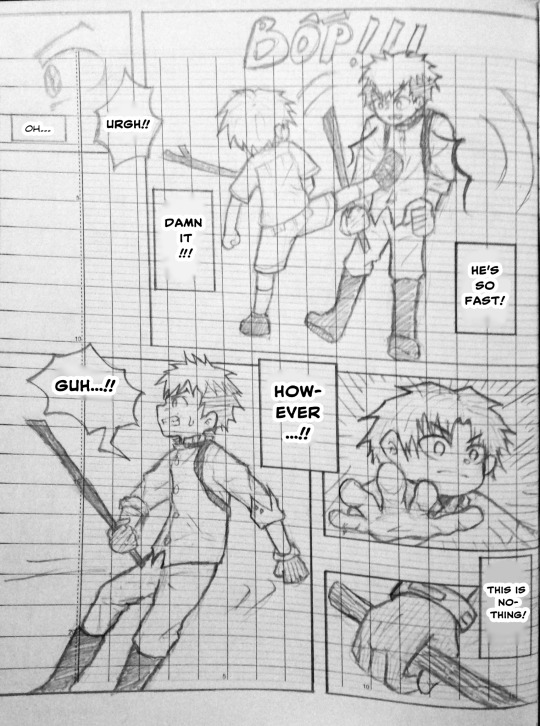
Kureto's physical strength is exceptionally stronger than normal people, so he quickly regained his balance and...

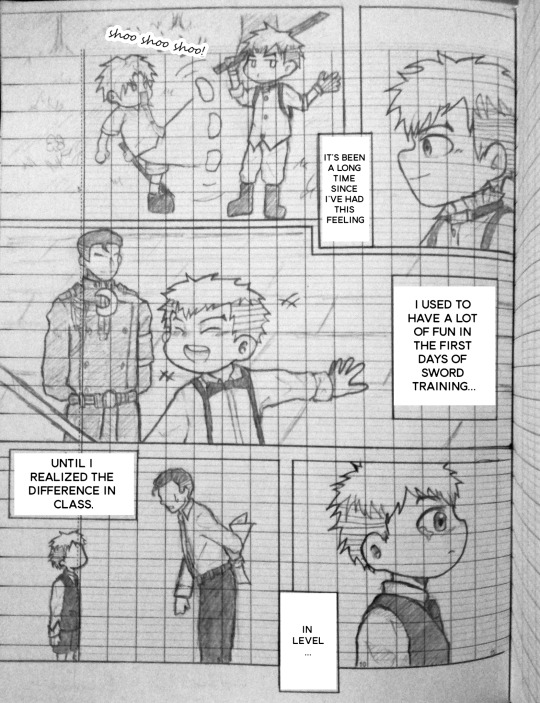
(Can you guess what happened to that teacher?
I didn't mention this in the fanfic, because the whole story is from Kureto's point of view, so he won't repeat what he already knows. So maybe I should add here. You can also skip it, because it doesn't affect the content of the story.
Simply put, this teacher was fired for being "disrespectful" to Kureto. Everyone is not allowed to be close or show any emotions other than work to Kureto, that is Tenri's way of education so that Kureto can eliminate his weakness which called "feeling". And because the teacher loved Kureto like his own son, he was immediately fired.
Of course Kureto didn't know that, the teacher's explanation was simply "You're so talented that I have nothing more to teach you, that's why they'll hire another teacher".
That's the reason Kureto thought it was due to class and level difference (Kureto at this time was only 6 years old, too young to recognize that was a lie. Maybe he'll realize it when he grows up.))
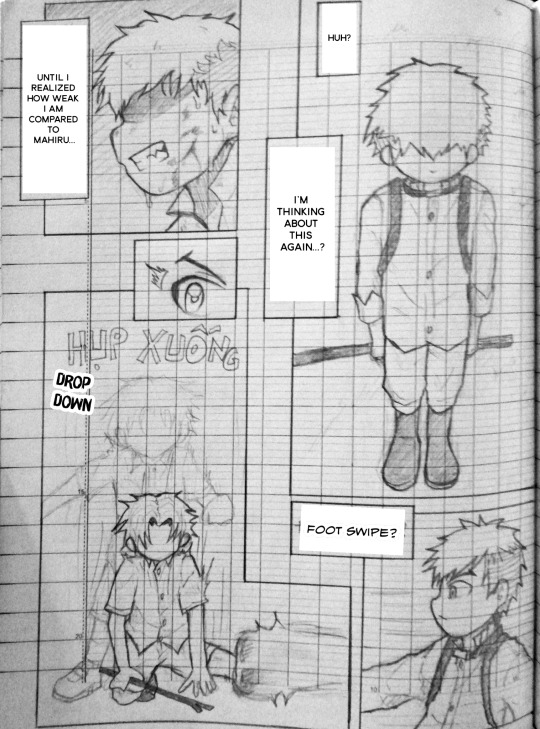
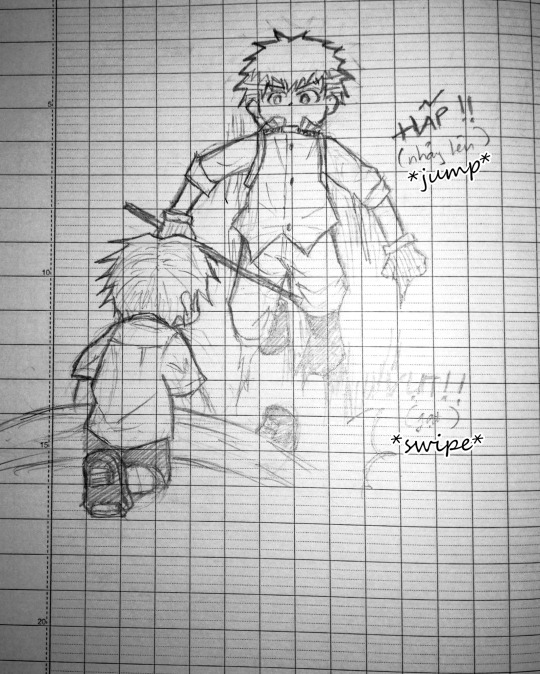
(It looks so funny, the way I drew doesn't look like jumping at all 🤣🤦♀️)

Why is Guren laughing? Could he be plotting something? Is Kureto trapped?
I hope to be able to complete the fight scene in the next part ( ꈍᴗꈍ)
By the way, I did a digital drawing of Kureto practicing sword. Our baby looks so innocent and cute when smiling!! It is my avatar now~

16 notes
·
View notes
Note
What should I say to a person who said that Peeta is a weakling and useless because they only watched the movie and refused to read the novel?
@curiouspeetamellark
Okay, so we start off with a firm slap to the head, hopefully knocking some sense into them. You show them my list of favourite moments of Peeta, because if that isn't already convincing, I don't know what is.
Honestly, one of my least favourite things from the movies is the fact that they downplay Peeta's strength and genuine value. But most movies tend to do that that's an issue for another time.
I'm usually pretty good at convincing someone to read/watch something. My cousin never reads if she can help it and I convinced her to read the entire Maze Runner series. So I'd try to convince them to read the books as well if you possibly can.
However:
I feel like people often confuse kindness for weakness, which is entirely wrong. Because one of the strongest people I know is also the nicest. Peeta is one of the most compassionate people in the series. He's loving, and basically human sunshine living behind the clouds. He's charismatic and likeable for literally everyone.
Physically, he's definitely not weak, that's pretty obvious, even with the toning down that the movies do. I mean he throws that weight with ease, he's obviously strong.
And through all the torture he goes through in the Capitol, he still comes back from it. He survives it. The mental, emotional, and physical toll of that torture is awful, we know that much. The books are from Katniss' point of view, and so we don't know exactly what he's subjected to, but Johanna says she and Peeta are "very familiar with the sound of each other's screams", so obviously whatever they experienced in there was awful. And he perseveres through and still comes back.
(Also commenting on the fact that he literally nearly killed Katniss and fought other people away while trying to even though he's clearly half-starved and beaten, so obviously he's strong)
Useless? Lots of people are alive who would've been dead without him. He warns District 13 that the bombs are coming, giving them extra time to evacuate the facility and get everyone to a safe space. The entire district is safer because of him.
And you just know that he endured even more crap for that.
Correct me if I'm wrong but didn't Coin want Peeta as opposed to Katniss as the face of the rebellion?
I mean, like... weak and useless, my ass.
It's one thing to make such a claim about our King, God and Saviour Peeta Mellark, but it's another to have no evidence to back it up.
I assure you, there's other characters to hate in this series as opposed to Peeta.
(Hoping this didn't come off as super rude, I know sometimes I sound really rude when I communicate opinions when I'm passionate, I don't mean to be)
Also I realised at the end of writing this that I seem really over critical of the movies, and I love the movies, don't get me wrong, it's just that movies often ruin characterisation of characters, although the Hunger Games movies are pretty good at keeping characterisation. I do have a couple of minor problems with the movies, but I still really enjoy the movies.
3 notes
·
View notes
Text
The Simple Power of Communicating with Kindness
Communication is a necessary skill for everyone, whether in business, politics, or social situations. Creating a culture of generosity involves more than just conveying information or persuading others; it requires making connections, building trust, and cultivating a culture of generosity. In other words, communication is all about kindness, and kindness is not a sign of weakness or naivety. It is a powerful tool that can assist people in achieving their goals and making a positive difference in the world.

We feel overwhelmed and happy inside our hearts when we perform an act of kindness. Kindness in communication can be expressed through a simple, thoughtful gesture that leaves us feeling good. Whatever act of kindness we perform is a powerful deed that makes us feel valued, respected, and happy, and doing something nice warms our hearts. There is evidence that showing kindness to others can boost our serotonin levels, the neurotransmitter responsible for feelings of satisfaction and well-being. Happiness breeds kindness, which breeds success. Continue reading to learn more about the simple power of communicating with kindness.
The Simple Power of Kindness Communication Methods
Kindness is an underappreciated virtue with enormous power to change our lives. Here are some ways to use the simple power of kindness in communication, which we will go over further below.
Using grace to break down defensiveness:
Dealing with defensiveness, which can arise from fear, insecurity, or misunderstanding, is one of the most difficult aspects of communication. Defensiveness can result in resistance, hostility, or conflict, which can harm relationships and stymie collaboration. Use graciousness, which is the quality of being courteous, respectful, and generous, to overcome defensiveness. It can also help to reduce tension, recognize different points of view, and find common ground.
Graciousness can also help people deal with criticism or feedback that is difficult to accept and give. People should not take criticism personally or defensively but rather see it as an opportunity to learn and grow, and they should be gracious when providing feedback to others. People should be specific, constructive, and supportive of others, as well as express gratitude for their work and recognize their own strengths.
Giving credit to others:
Giving credit to others for their contributions and accomplishments is another way to show kindness in communication. Giving others credit is not only fair and honest, but it is also beneficial to one’s own reputation and influence. It also demonstrates that you are humble, generous, and collaborative, which fosters trust and loyalty among colleagues and partners.
Crediting others doesn’t just mean saying thank you or praising them publicly; it’s about recognizing their ideas, insights, and efforts, sharing the spotlight, and celebrating their achievements. Giving credit can help foster a generous culture in the workplace. Giving credit on a regular and sincere basis can inspire others to do the same, resulting in a positive communication feedback loop that motivates everyone to perform better and support one another.
Making Space for Others:
Communicating with kindness is another way to create space for others to speak up, share their opinions, and contribute their talents. It also entails actively, attentively, and empathetically listening to their points of view. Making space is essential for communication and leadership because it demonstrates the importance of diversity and inclusion. It demonstrates our appreciation for diverse points of view and experiences, as well as our willingness to be open-minded and curious. All of this enables people to learn new things, take on new roles, and solve problems more effectively. Individuals can foster a sense of belonging and community among their coworkers.
Closing Thoughts
Positive Communication entails more than just words and actions; it entails emotions and intentions, as well as how you affect others and how they affect you. Kindness is essential for effective, meaningful, and fulfilling communication. Kindness is not a luxury or a weakness; rather, it is a necessity, a strength, and the simple ability to communicate with kindness. There are ways to communicate with kindness that can work, such as graciously breaking down defensiveness, giving credit to others, and making room for others.
Visit More : https://theeuropeentrepreneur.com/management/the-simple-power-of-communicating-with-kindness/
0 notes
Text
Looking Back To Move Forward- The Importance of Self-reflection.
Imagine you’re a baker trying to perfect the recipe of a new cake for your bakery. The first time you try, the cake does not rise and instead of evaluating which ingredients work or if they are the correct amounts, you just remake the batch expecting a different outcome. Quite silly, isn’t it? Well, this is the same concept of self-reflection. “We learn by experiences and mistakes. But, unless we question ourselves about what our experiences mean and think actively about them, research has shown that we won’t make any changes” (Herbert-Smith, n.d.).
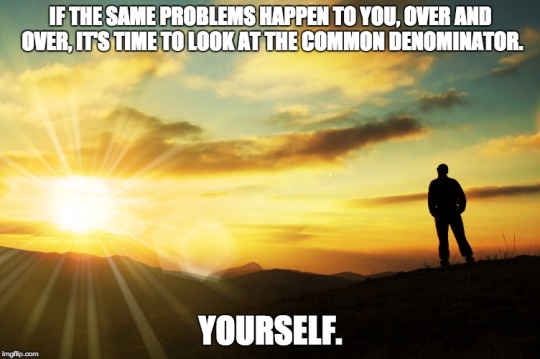
It feels like it is just yesterday that I received my university acceptance letter and to think that I am almost three-quarters of the way through to being an OT is surreal. Whilst I am proud of all the growth I’ve made, there are some “ingredients” that need tweaking. At this point in my journey, it is important to not just reflect on how far I’ve come but also where I am going and how I could be the best OT I envision to be. “Reflecting helps you to develop your skills and review their effectiveness, rather than just carry-on doing things as you have always done them.” (The Open University, n.d.)
According to The Open University,( n.d.), some factors that guide reflection include thinking about your strengths, weaknesses, happiness, and solutions. When I reflect on my journey, I count my ability to build a rapport with my client, show understanding and show empathy and not sympathy as valuable strengths.
Whilst capitalizing on my strengths is important, my weaknesses may overshadow if neglected and not improved on. “If you have a strong right arm and a very weak left arm you will always favour your strong arm to carry something heavy. Over time, you risk tweaking your back because you’ve been putting so much weight on one side of your body”. (Lipkin, n.d.)
One of my biggest weaknesses is being unable to be overly firm in my handling of patients when required. I am able to set boundaries but the line between respecting a patient’s choice and being firm to ensure the therapeutic nature of a session is not as clear as it should be to me. This is a weakness that I have identified and am working on.
These are just a few examples of my strengths and weaknesses that I need to harness and improve respectively as I continue to journey to be a qualified OT.
Another factor that guides self-reflection is feedback from others. Feedback is known to increase “self-awareness, helping you reflect on your performance and progress in your current role.” (Deeper Signals | the Top 5 Reasons Why Feedback Is Critical to Success, n.d.). I used to be fearful of feedback but now I view it as a chance to learn and grow.
The basis for self-reflection is passion. “Passion is an essential ingredient in being the best you can be, bringing you pride and purpose—and advancing your career to heights you may not have considered.” (What Does It Mean to Have Passion in Your Work? And Why Is It Essential? n.d.). This passion is what drives me and will continue to drive me to make these changes and not just offer a service to others that is merely acceptable but to be able to look back after providing therapy and be proud of what I had to offer. So, no matter how difficult some days may get, I let go of the mistakes, hold on the lessons, and move forward towards growth. As I am closer to the end of my OT student journey, constant self-reflection is what will aid me in achieving my goals.

References
Deeper Signals | The Top 5 Reasons Why Feedback is Critical to Success. (n.d.). Www.deepersignals.com. Retrieved August 18, 2023, from https://www.deepersignals.com/blog/the-top-5-reasons-why-feedback-is-critical-to-success#:~:text=Encouraging%20self%2Dreflection&text=In%20this%20way%2C%20feedback%20is%20an%20important%20means%20for%20increasing
Herbert-Smith, K. (n.d.). The importance of self-reflection. Blog.irisconnect.com. https://blog.irisconnect.com/uk/community/blog/importance-of-self-reflection/#:~:text=Self%2Dreflection%20enables%20you%20to
Lipkin, N. (n.d.). You Need To Know Your Weaknesses To Boost Your Success. Forbes. Retrieved August 18, 2023, from https://www.forbes.com/sites/nicolelipkin/2022/06/28/you-need-to-know-your-weaknesses-to-boost-your-success/?sh=40b4e6307221
The Open University. (n.d.). Www5.Open.ac.uk. https://www5.open.ac.uk/choose/unison/develop/my-skills/self-reflection#:~:text=Reflecting%20helps%20you%20to%20develop
What Does It Mean to Have Passion in Your Work? And Why Is It Essential? (n.d.). Www.linkedin.com. https://www.linkedin.com/pulse/what-does-mean-have-passion-your-work-why-essential-cheri-gudaitis
1 note
·
View note
Text
The Strength of a Woman
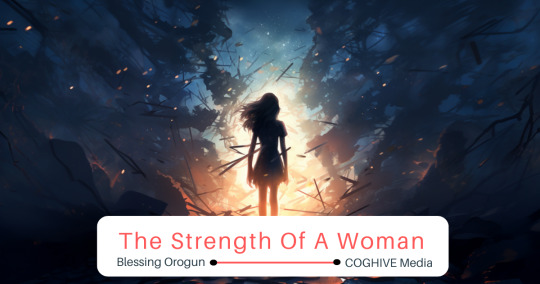
The human mind has always been fascinating to me. The way it works and how it processes things or events is yet to be fully understood.
The most outstanding thing is how no two minds are precisely the same. While there are similarities, there are also stark differences.
Growing up, I used to think that the mind was situated in the chest region, possibly close to the heart, because of the immense power I had come to know that the mind possessed. But as I became more mature, I learnt that it is situated in the brain.
As unique as every human mind is, so is every woman; different in body size, skin tone, exposure, capabilities, intellect and interests, yet still amazingly incredible. The strength a woman possesses cannot be adequately quantified with the use of words. It is best observed, absorbed and taken in. It can be likened to a magnificent work of art that always leaves you in awe.
Is it the way she brings life into the world? Just the other day, we were told about one of our workers who fainted as she witnessed the vaginal delivery of a woman in the labor ward for the first time. Whether vaginal delivery or via caesarean section, it takes great strength to go through childbirth.
Or is it her multitasking ability? She can be a career woman, an entrepreneur, a home keeper, a great mother and a dutiful wife all at the same time. Little wonder, she accomplishes whatever she sets her mind on.
She is soft and delicate but this should not be viewed as a weakness. It just means she has this strength that shouldn't be underestimated. It might take some time to get through the rock, but like water, she always finds her way. She is exceptionally determined about everything and this sustains her. Even when she tires, she finds the means to be refreshed and gets back up.
Another great power of a woman is her intuition. She often always knows when something will be right or wrong. The world doesn't always play fair to her and this might be why she was blessed with this incredible intuitive power. Could this be an evolutionary survival instinct? A woman who does not ignore her intuition is wise. It prevents her from being easily manipulated and it often keeps her from harm.
A woman is elastic. There is no telling what she can endure and what she cannot. She can move to the ends of the earth if she has to. She is adaptable, creative and ingenious. But like every elastic, she has an elastic limit and a breaking point and you do not want to be on the wrong side of her fury. If you have doubts, watching Tyler Perry's "Diary of A Mad Black Woman" should be proof enough.
A woman's strength isn't something to be feared, but to be encouraged. Over time, she has been put down and relegated to the bottom but times are changing.
Everyone is coming to the realization that the woman is a valuable asset to society. She has more opportunities for growth and development. Unlike in the past, she is more visible and her voice is now louder. She knows her rights and demands to be treated fairly.
The strength of every woman is as unique as every mind. It is non-exhaustive and this piece cannot fully capture all it encompasses. But one thing that remains common to every woman is that her strength lies in fully embracing her femininity, recognizing its purpose and being that which she has been called to be.
This calling is different for every woman but there's no limit to what she can attain once she has found her path. The woman is on a journey, and this strength that she has been blessed with will always enable her to thrive.
Read the full article
0 notes
Text
The Art of Persuasion
John Sawyer
Bedford Presbyterian Church
5 / 14 / 23 – Sixth Sunday of Easter / Mother’s Day
1 Peter 3:13-22
Acts 17:21-32
“The Art of Persuasion”
(Common Ground is Holy Ground)
My family and I were walking down the sidewalk in our neighborhood last week when someone pulled into a nearby driveway and hopped out of their car. The car had a whole collection of bumper stickers on it, but one of those stickers caught my eye. I’m paraphrasing here, but the sticker basically said, “[Blank] you if you voted for [So-and-so].” I’ll leave it to you to fill in the blank with a certain word, but it’s Mother’s Day, and my momma taught me to not to fill in the blanks with language like that.
Now, I do believe in freedom of expression, but some ways of expressing ourselves are more effective than others. If the bumper sticker in question is trying to persuade me of anything, what is it? Am I persuaded to listen to the message of a sticker that is cussing at everyone who reads it? Not really. Am I persuaded by the sticker to vote one way or the other? Not necessarily. Am I persuaded that my own point of view matters to the sticker in light of the statement being made by the sticker? No. . . I’m not convinced that the sticker wants to hear my point of view or even entertain my questions. My main quibble with the sticker is that it leaves no room for grace. It’s argument – if you want to call it an argument – is too final: “If you don’t agree with me, then I will have nothing to do with you.” You know, it seems like a lot of people in this day and age – no matter how they vote or what they believe in – have this same mindset, but is this the most effective mindset for and means of persuasion?
There is a line in today’s first reading from the First Letter of Peter that makes me think of the sticker – and, yes, the person who placed it on their car, and everyone else who feels that it should be their way or no way at all. The author of this letter from nearly 2,000 years ago writes, “Always be ready to make your defense to anyone who demands from you an accounting for the hope that is in you; yet do it with gentleness and reverence.” (1 Peter 3:15b-16a). To put it another way, “Be ready to speak up and tell anyone who asks why you’re living the way you are, and always with the utmost courtesy.”[1] However you put it, gentleness and reverence – courtesy – are the preferred modus operandi – the preferred way of persuasion, according to the author of 1 Peter. In the original language, the word “respect”[2] could be used here, as well. One other note about the original language. . . The phrase “always be ready to make your defense,” or “defend yourself” comes from the Greek word apologian – a word that sounds a lot like our word “apology.” Now, I know that in the present day, in certain circles, to apologize for anything might be perceived as a sign of weakness, but, according to scripture, defending or sharing your point of view with gentleness and reverence, courtesy and respect is a sign, not of weakness, but of spiritual strength. And – miraculously enough – with God’s help, courtesy still works.
We see the spiritual strength of gentle and respectful persuasion at work in today’s reading from the Book of Acts. The Romans had conquered Greece 150 years before the time of Jesus, but by the time the Apostle Paul arrives in Athens, it has been the epicenter of thinking and learning for hundreds of years and – as far as Paul can see – the tradition of encountering new ideas is still strong there. According to today’s story, “. . . all the Athenians and the foreigners living there would spend there time in nothing but telling or hearing something new.” (Acts 17:21). You see, all kinds of thinkers – philosophers, mathematicians, playwrights, and others – had found their way to Athens over the centuries to listen and be heard, to gain wisdom and insight into the things that mattered most, like what is the purpose of life, and what does it mean to be a good person, and what is the nature of truth.
Mixed up with this strong tradition of learning, Paul finds that there is also a strong tradition of religions. There are the traditional Greek deities – like Zeus and Ares – and their newer Roman names, Jupiter and Mars. There are also other religions from other parts of the known world – people who pray to different (small “g”) gods in different languages with different rituals. In today’s story, many of these religions are represented all around the city of Athens, and the place where a lot of the “telling and hearing of new things” takes place is a hill called the Areopagus, which served as a judicial court and marketplace of ideas in ancient times.[3]
In today’s story, Paul steps in front of the people who have gathered at the Areopagus, and does so with the utmost respect, as Eugene Peterson translates:
It is plain to see that you Athenians take your religion seriously. When I arrived here the other day, I was fascinated with all the shrines I came across. And then I found one inscribed, TO THE GOD NOBODY KNOWS. I’m here to introduce you to this God so you can worship intelligently, know who you’re dealing with.[4]
Paul could have begun by telling them how wrong they all were – worshiping idols and making sacrifices to false gods. This would have been the, “If you don’t agree with me, then I’ll have nothing to do with you” approach. Unfortunately, this has been the method of Christian missionaries, and conquistadores, and crusaders throughout the centuries – wrongly “converting” people to Christianity through fear and coercion. Instead of using this approach, though, Paul artfully persuades the people to listen to him by treating them with respect. He begins by finding a place of agreement – that faith and religious practice are important for both Paul and for the Athenians. He also finds a way into the the Athenian mindset. Apparently, they have a shrine to an “unknown god” – a god that nobody knows. In the original language, the word “unknown” is the Greek word, “agnostos”[5] which sounds like our word “agnostic” – a word that many people who think of themselves as “spiritual, but not religious” might use to describe themselves. They might have some sense or feeling that there is something out there beyond themselves, but it is unknown and mysterious. They don’t have certainty about it yet and aren’t sure they ever will. Or, as Webster’s Dictionary describes it, “the ultimate reality of God is unknown and, probably unknowable,”[6] to them, or so they think.
But, as Paul says, this “unknown god” might not be as unknowable as the Athenians think. He goes on to describe the world that they can see as the world that this “unknown god” has made and starts to paint a picture of what, maybe, was considered, by some, to be a “small-g god” as the one true “Big-G God.” “God has made all things,” Paul says, “and has even made human beings.”[7] And then, Paul says that one of the fascinating and beautiful things about God and human beings is that God made human beings in such a way,
“. . . so that they would search for God and perhaps grope for God and find God – though indeed God is not far from each one of us. For ‘In him we live and move and have our being’; as even some of your poets have said. . . ‘we, too, are God’s offspring.’” (Acts 17:27-28)
Paul is saying several important things, here:
1) we human beings are hard-wired
to look beyond ourselves
for greater and deeper meaning;
2) the answer we seek is closer than we think; because,
3) ‘in God we live and move and have our being.’
This last thing is a smart move by Paul, quoting the ancient Greek poet and thinker, Epimenides.[8]
Now, I don’t know the last time that you quoted Epimenides, but this is the only line of his with which I am familiar. What Paul is doing with this line, though, is using a common-knowledge cultural touchstone that the Athenians would have been well-acquainted with, again, to find some common ground with them. “God is all around us,” Paul is saying, here, “and because of this, God is not nearly as unknown or unknowable as you might think.”
If God, is indeed, all around us – and if “we are God’s offspring” (another quote from another Greek thinker) [9] God is not unknown or unknowable. We have the person and example of the God we have come to know in Jesus Christ, Paul tells the Athenians, (17:31) who offers resurrection – new life.
So, what are we to do with all of this – especially in the age of division and disagreement in which we currently find ourselves? Just this past week, we received both a postlude and a prelude to the political rancor that lies both behind and ahead of us as we get ready for yet another election cycle. I cannot predict the future, but I can almost guarantee that there will be something or someone who will set us off and get our blood boiling – from bumper stickers to the true believers who put those bumper stickers on.
It seems like there are far more people who are itching for a fight than they are looking for a respectful, courteous conversation. But we who would try to follow Jesus Christ are called to strive for the latter.
A friend of mine recently shared one way of disarming someone who is itching for a fight. It is simply to use three little words, which are: “Are you okay?”[10] Now, these words are not to be used lightly or in an accusing way as if we are telling someone they are not okay. Instead, these words are to be used graciously and genuinely. Words of love and care have a tendency to unclench fists and find cracks in hard hearts so that some light can shine through. Before you and I even engage in a battle of ideas or ideologies, what if we began with authentic love and care for one another? You see, we human beings will often forget that we are hardwired to look beyond ourselves for the Holy and we are often too busy looking inward, toward our own thoughts and feelings, as a way to react to someone who stands in opposition to us. It’s funny, I did see another bumper sticker this past week that said, “Don’t believe everything you think.” This is so true, especially if we think another person and their point of view aren’t worth our time or engagement, or if we think that someone else is beneath us, or worse. If God has hardwired us to look beyond ourselves, what if we did look beyond ourselves to our neighbor and lovingly asked, “Are you okay?”
Because, if we’re honest, contrary to the title of that self-help book from the late 1960’s,[11] I’m not okay and you’re not okay, and the person with the “[Blank] you” bumper sticker is not okay, and the candidates and talking heads on TV are not okay. . . We are all more driven by fear than by hope – fear of one another, fear of what the future holds. But, as we read earlier in 1 Peter, you and I are encouraged to “not fear what they fear and do not be intimidated. . . always be ready to make your defense to anyone who demands from you an accounting for the hope that is in you.” (1 Peter 3:14-15) This hope – in God and God’s grace, in the One who has shown us the way of gentleness and reverence, respect and courtesy – stands in stark contrast to the fears that have taken hold of us (the fears to which we grip so tightly because fear is so much easier than hope). But God’s love has the power to change us – and others, through us.
The God in whom we live, and move, and have our being is as close as our next breath and refuses to give up hope in us. For when we said, “God, I’ll have nothing to do with you,” God said, “My child – I’ll have everything to do with you because I love you.” God’s love gives me hope – hope in something beyond myself and my limited way of seeing the world. God’s love gives me hope – because, as hard as it might be for us to imagine, no one is unredeemable. We are all God’s children – no matter how abhorrent our ideas and attitudes might be to one another. No one is unworthy of God’s love. . . or our love. Jesus has made this so in his incarnation, his life, his dying, and his rising. By the grace of God, this is something that we all hold in common. May we – as hard as it is – find this common ground, together. For this ground is Holy.
Friends, have hope, and always leave room for grace, and be thankful when you encounter some grace in return.
In the name of the Father, and of the Son, and of the Holy Spirit. Amen.
-------
[1] Eugene Peterson, The Message: Numbered Edition (Colorado Springs: NAV Press, 2002) 1679. 1 Peter 3:15-16.
[2] Walter Bauer, A Greek-English Lexicon of the New Testament and Other Early Christian Literature (Chicago: University of Chicago Press, 1979) 863.
[3] https://en.wikipedia.org/wiki/Areopagus.
[4] Eugene Peterson, 1521. Acts 17:22-23.
[5] Bauer, 12.
[6] Webster’s Ninth New Collegiate Dictionary (Springfield: Merriam-Webster, Inc. Publishers, 1988) 65.
[7] See Acts 17:24-26.
[8] https://en.wikipedia.org/wiki/Epimenides.
[9] Aratus, a third-century BCE poet.
[10] https://www.cnbc.com/2023/04/25/etiquette-expert-use-this-3-word-response-when-someone-is-rude-to-you.html?utm_content=Main&utm_medium=Social&utm_source=Facebook&mibextid=Zxz2cZ&fbclid=IwAR0_rPTwUcNuXHvvNl3eeVl2ytDqWy8pzQWczQm5Iyl3_tcDBZvbDCcssaA#Echobox=1683126893.
[11] Thomas Anthony Harris, I’m Okay, You’re Okay.
0 notes
Text
A Half-Built Garden by Ruthanna Emrys and Goliath by Tochi Onyebuchi
I started both of these books near the end of last year, alternating between them at home and on my commute. I ended up leaving both half-finished, partly because other circumstances made me feel that I wasn't giving either one the attention it deserved. But also, because the resonances between them—the unexpected similarities, the profound differences, and the way one seems to fill the gaps left by the other—made both reading experiences more fraught than I think either one on its own would have been. I knew that I wanted to return to both books, and happily the looming Hugo deadline created the impetus to do so. These are both very good novels, but I think reading them together has not only helped shed light on their relative strengths and weaknesses, but on some of the trends currently running through science fiction.
A Half-Built Garden is a first contact novel. In the late 21st century, Judy Wallach-Stevens is a hydrologist in the Chesapeake watershed, one of a loose network of quasi-anarchist collectives that have dedicated themselves to restoring the Earth's damaged waterways and reversing the ravages of climate change. On call on an evening when an anomalous sensor reading shows up in her sector, Judy sets out, wife Carol and infant Dori in tow, to discover an alien spaceship. The aliens, who soon come to be known as Ringers, inform Judy that humanity is saved: they have come to take us away from our dying planet, to join in their multi-species alliance on a network of deep space habitats.
The novel thus quickly establishes a different sort of alien invasion, one driven by compassion rather than greed. Intelligence, Judy is informed, is incompatible with planetary living. "All species must leave their birth worlds, or give up their technological development, or die. You are very close." For someone who has dedicated her life to the dream of restoring the Earth—and more importantly, to the belief that humans are capable of changing in order to live in harmony and respect with their natural environment—this insistence shakes Judy to her core (all the more so when the Ringers reveal that they want to break down some of the solar system—perhaps even the Earth itself—for building materials for humanity's new habitats). It appears more congenial to the planet's other major political forces, the remnants of national governments and of megacorporations. Both have been reduced to fractions of their former power—the corps are mostly corralled on artificial islands and forced to abide by restrictive carbon budgets—and see in the Ringers' offer a chance to regain it.
Before long, the dilemma raised by the Ringers' presence—should humanity abandon its efforts to heal the Earth and leave for the stars—fractures into a thousand smaller but thornier issues. A corporate attack on the watersheds' networks—message boards governed by complex algorithms that give weight to opinions based on social credit and help shepherd consensus—foments distrust and paranoia, leaving individuals and groups to make decisions on their own, with results that are often disastrous. The Ringers' leader grows increasingly frustrated with the watersheds' to-her-irrational insistence on remaining on Earth, and begins to contemplate the forced removal of humanity for our own good. Both the US government and the corporations take advantage of the situation to press their advantage with the Ringers and, along the way, advance their core philosophies. Before long, Judy's task balloons from convincing the Ringers that Earth is still salvageable to dissuading them from allowing the corporations a foothold in their society.
In both her worldbuilding and character work, Emrys returns again and again to the idea that cherished values—often arrived at after painstaking trial and error—can seem rigid, insufficient, and even oppressive from another point of view. Ringer society is strongly matriarchal, centering birthing mothers in leadership roles—Judy earns her spot as ambassador due to the accident of having brought Dori to first contact, because Ringers believe the presence of children in negotiations promotes harmony and encourages good behavior. Judy recognizes the wisdom in this approach, but she's also shaken by the biological essentialism it implies. But then, Judy has trouble dealing with anything that challenges her cherished dogmas. Even when you agree with her about, say, the rudeness of asking whether she or Carol are Dori's "real" mother, or the nihilism of taking Earth apart for raw material, the constant stream of judgment in her internal monologue can come to seem priggish and overbearing. In this, she makes for a good counterpart for the Ringer leader Cytosine, who like Judy is driven to both anxiety and imperiousness by humans' refusal to follow the script in her head.
Nowhere is the clash of values—and the limitations of Judy's worldview—more apparent than when the Ringers and watershed representatives visit the corporate islands. Absent any real power, the corporations have turned inwards, playing elaborate, cutthroat games of hierarchy in which complex fashion and gender presentations play an integral role. When Judy expresses fatigue with this gamesmanship and suggests that a low-ranking corporate honcho might be happier in the watersheds, where there is no scrambling for position, she's told:
"I'll keep my salary, thanks. And my spot on the ladder. What you people don't get is that this stuff"—they gestured at the magenta velvet clinging to their torso, spreading into a skirt that flared as they stood and twirled for us—"is fun. Because of the challenge, not in spite of it. Challenges keep life interesting, even when we don't have visitors from other worlds."
It's a wrongfooting moment. We naturally share Judy's distrust of the corporations, and yet there's something a bit puritanical about her distaste for their games, and one wonders whether the watersheds can accommodate things like healthy competition and ambition.
It's in these chapters that my issues with the novel finally crystalized. For all Emrys's careful worldbuilding, there's something very empty-seeming about the A Half-Built Garden's world. The anarchic, highly intentional, deeply idealistic society of the watersheds seems like something you could maintain with a population of thousands, not millions. The US is represented only by its government, with no sense of how its citizens live. And the corporations seem to consist entirely of executives and wannabe executives. It never feels believable that any of these groups are seeing to the needs of—are providing the ideological framework for—billions of humans. And that impression is only complicated when the same corporate representative explains to Judy why they think the corporations taking up the Ringers on their offer won't lead to another age of rampant, destructive growth.
"I think the problem with the corporate age was that we tried to have it here. It's obvious that our ideas were made for space. You could have mines the size of planets and skyscrapers the size of stars, and extract resources for centuries without breaking the systems you're extracting from. The networks can keep Earth—it'll be a backwater, but they can have it. We'll take the rest of the universe in trade."
But, well, who's going to work in those mines? Who's going to extract those resources or clean those skyscrapers? Judy despises the corporations for how they destroyed Earth's environment, but long before they did that, they exploited and abused workers. Capitalism has always presented itself as a game where anyone with brains and nerve can triumph and rise to the top, but that has always been a lie. The system requires the existence of an exploitable underclass. The fact that Judy never mentions this—even when it might offer a more persuasive justification for her hostility towards the corporations—makes her look like that caricature of an environmentalist, more worried about spotted owls than people. More importantly, it clarifies the core problem with A Half-Built Garden, and its attempt to talk about a sustainable future society. This is a world without an underclass—not, it seems to me, because such people have been brought up to everyone else's level, but because Emrys neglected to put them in her story.
The missing underclass is what Goliath concerns itself with, though in so many other respects it and A Half-Built Garden seem to be struggling with the same issues and deploying the same tools. Here, too, we have a world in the late 21st century groaning from the ravages of climate change. Here we also have humanity escaping the Earth for the stars, and invaders who want to dismantle what's left for their own purposes. But here, both the locals and the newcomers are human.
The world of Goliath is the nightmare scenario for someone like Half-Built Garden's Judy. Climate change has been allowed to run rampant, leading to natural disasters, infrastructure collapse, and the poisoning of much of the environment. High levels of radiation and air pollution cause organ damage and skyrocketing cancer rates, unless you happen to live under a dome—which are reserved for the affluent—or can afford cybernetic organs. Instead of groups like the watershed networks emerging to fix the problem and push back against the corporations exacerbating it, in this world the response of most people who are able—which is to say, most white people—is to leave, relocating to orbital colonies and leaving behind those with no options. Who are overwhelmingly poor, and, in the novel's setting of New Haven, Connecticut, nearly all black.
This new type of white flight elicits a range of reactions from those left behind. "Best thing that coulda happened to the planet was that all the white folks left it," one muses, but others observe the dwindling tax base, and the growing indifference and corruption of governments who have nobody but the poor and racialized to oversee. As the novel opens, a reversal is beginning, with people from the colonies—which are, after all, no less capitalistic than Earth, and have developed their own lower classes—returning to Earth for cheap real estate as well a fantasy of pioneering. This return, too, provokes different reactions. Some people are glad about the resumption of social services, hopeful that the presence of white people in their neighborhood will mean cleaner air and water. Others worry about over-policing, as when an entire building is put on lockdown because one resident traveled to a pandemic zone ("Ugh, this is what happens when your building's full of white people. All of a sudden, everyone cares about your health"). One character, however, sums up the novel's thesis when he observes a returner couple who have purchased a house in his neighborhood: "He saw those aliens and was terrified".
The aliens in question are David and Jonathan, a young couple whose courtship and decision to make a life on Earth give Goliath a loose framing story. But, despite segment headings that break up the novel by the seasons of the year, its narrative is unmoored in time. It moves from past to present and back again in a way that seems designed to force the reader to scramble to keep up. A long middle segment intercuts between two flashbacks whose relevance to the plot doesn't become clear until right at its end. Characters swim in and out of focus, their relationships shifting off-page. Some chapters are a transcription of one character or another shooting the shit, delivering long, meandering monologues of little significance (sometimes to a reporter who has been chronicling the lives of the left behind, trying not to come off like a visitor at the zoo, and mostly failing). A throughline in some chapters revolves around the discovery of horses living wild outside the city and the construction of a stable for them, a rare instance in which those left behind can reclaim both their neighborhood and their natural environment. But this is a thread that is dropped and returned to more than once.
What ties the novel together, instead, is the primary occupation of most of its characters. In an opening scene, a pair of city employees demolish an abandoned house in an impoverished neighborhood by dropping a gravity bomb on it that sucks its components into a wormhole.
Municipal engineers never figured out how to get the disc to swallow up the more unwieldy parts of the home, so the undigested bricks would be vomited in a pile of architectural effluvium on top of the disc that someone would then have to fish out. And just as his truck would leave or just as they would retrieve the disc, stackers would swarm over the site, harvesting the bricks for building residential units up in the space colonies.
It's among these "stackers"—people who dismantle New Haven's red brick homes and the halls of Yale university so that the bricks can be sent into space—that most of the novel is set, a loose group of people working a hard, contingent job. (Nor is this the only way in which characters in the novel make their living by taking apart their world. One of the stackers, Sydney, is introduced to us in the desert alongside her father, poaching endangered cactuses and auctioning them to customers in space looking for a bit of Earth exotica.) They are young and old, men and women, New Haven natives and newcomers from other parts of the US with complex and often tragic backstories. They go about their task with a matter-of-factness born out of necessity. It's not that they're not cognizant of the significance of their work—one of the demolition men in the opening scene thinks, of the houses he tears down, that they "were like the Pyramids in Egypt. It made sense that humans had built them, but without the stuff that they had now, such things seemed an impossibility." But, as that thought suggests, nothing in his life has encouraged him to think about the future.
To an extent, this is true of the novel as well. At its most schematic, Goliath feels like a litany of real-world injustices—gentrification, overpolicing, environmental racism, mass incarceration—ported into a future setting. But at its best, the novel persuasively argues that these are things that would continue, and worsen, in a world ravaged by climate change and its attendant political upheaval. William Gibson wrote that the future isn't evenly distributed. In Goliath, the boundaries of that distribution follow racial lines: who gets a protective dome over their neighborhood; who gets surveilled by robot cops. And whatever the have-nots manage to cobble together when the eye of the state is turned away from them, is destroyed when it's deemed of no value, or taken away from them when it is.
Towards the end of the novel, a multi-racial, queer alliance of well-intended activists, something similar to A Half-Built Garden's watersheds, arrive in New Haven promising "Green jobs, not jails." But in Onyebuchi's telling, unlike Emrys's, the logic of this influx runs from paternalism towards oppression. David and Jonathan promise each other to be good neighbors, benevolent gentrifiers. But when push comes to shove, they can't help but deploy their privilege to destructive ends. The biblical reference in their names and the novel's title seems designed to answer a question that people ask when overt violence erupts in a place where it has long existed unobserved. This is what happens, the novel seems to be saying, when you tell people they have no future.
A Half-Built Garden ends with Judy arguing for humanity's right to make its own decisions against a Ringer tribunal who insist that we are too childish and immature to make our own choices. This makes it an interesting riposte to the ongoing fashion for "cozy", "optimistic", "kind" science fiction, which often seems to fail on its own terms. Too often, what these novels call kindness is actually the flattening of all difference, and what they call coziness is a refusal to acknowledge cruelty. This novel recognizes that kindness is hard, that well-intended people can have wildly diverging points of view that can lead them to abuse and dehumanize others, and that conflicts are not won by "destroying" your opponent with a killer argument, but by getting them to see you as someone worth compromising with—even if that means sitting across a table from someone who thinks you shouldn't be allowed to make your own decisions.
Goliath, on the other hand, is a novel about living in a world where the person at the other end of the table can't be convinced of your humanity, even as they tell you that they're one of the good ones. As such, it is a bleak story, one that insists that racism, and the underclass, will always be with us in one form or another. Which I suppose makes the choice between the two novels a bit revealing. Do you prefer science fiction that imagines new solutions, even if to do so it has to simplify the problems? Or does it feel more important to have stories that acknowledge the scope of what we're dealing with, without giving the reader the out of a hopeful ending? Or maybe the question is, which elision—of the ugliness of the now or the possibilities of the future—bothers you more?
Personally, I think Goliath is the more necessary of the two novels, if only because science fiction doesn't tend to tell its sort of story. I also think it's the better book, more gripping and effective in its emotional argument. But then, that question of affect can't be disconnected from the two works' goals, and a novel like A Half-Built Garden, so focused on compromise and conversation, is simply not reaching for the same visceral emotion that Onyebuchi's writing is. And I also worry that in preferring the darker, more hopeless novel, I'm falling into the opposite trap of those who crow about "optimistic" fiction, wallowing in a misery that is not even my own. I suppose what I really want is a book that does both things—look the present in the eye, and then reach past it into the future.
0 notes
Text
Surviving the concept of self

Surviving the concept of self is a difficult process in life. It requires us to make difficult decisions, often times feeling like we are not living up to our full potential. We have to constantly ask ourselves questions like “What do I want out of life?” and “How do I get there?” In order to survive this concept, we must learn how to trust our instincts and make decisions that will lead us down the path of success.
One way to survive the concept of self is by understanding our personal values and goals. We should take the time to reflect on what matters most in our lives and prioritize those values over any materialistic desires or instant gratifications. Additionally, it is important for us to be aware of our strengths and weaknesses so that we can use them as tools for achieving our goals.
Another way to survive the concept of self is by being mindful of our emotions. When faced with difficult decisions or challenging situations, it is important for us to remain aware of how we feel in order to make the best decisions possible. We must learn how to identify when we are feeling overwhelmed or stressed so that we can take steps back and assess the situation from an objective perspective. Additionally, it is essential for us to practice positive self-talk in order to maintain a healthy mental state during times of struggle or hardship.
Surviving the concept of self requires us to be resilient in moments when things don’t go as planned. It’s important for us to remember that failure can actually be a learning opportunity if we approach it with an open mind and look at it objectively rather than letting it weigh heavily on our hearts and minds. By learning how to cope with adversity and setbacks, we can stay focused on achieving our goals no matter what roadblocks come in our way.

Surviving the concept of self is an ongoing journey that requires constant effort and dedication from ourselves but is ultimately worth it if it leads us down a path towards success and fulfillment in life
The concept of self is an incredibly complex one and something that all individuals must grapple with at some point in their lives. It involves understanding who we are and how we fit into the world around us, as well as how we interact with other people and our environment. This can be a difficult journey for many, as it often involves confronting difficult emotions, coming to terms with personal failures, and navigating shifting social expectations. However, it is possible to survive this process and come out stronger on the other side. By exploring the concept of self, understanding its importance in our lives, and learning how to cope with its challenges, we can equip ourselves with the tools necessary to thrive.
What Is The Concept Of Self?
The concept of self is a term used to describe an individual’s sense of identity. It is made up of both conscious and unconscious elements that contribute to our feelings about ourselves and how we view the world. These elements include our thoughts, beliefs, values, goals, experiences, relationships, physical characteristics, roles in society (such as gender or profession), and even our possessions or material items that hold meaning for us. By understanding these components of ourselves, we can gain insight into who we are as individuals.
Why Is Understanding The Concept Of Self Important?
Understanding the concept of self is important because it can help us make sense of our life experiences and shape how we interact with others. When we know ourselves better – what motivates us, what values are important to us – it gives us a better understanding of why certain things in life may have been difficult for us or why certain relationships may not have worked out. Knowing ourselves better also helps us make decisions that align more closely with who we truly are at our core instead of simply reacting based on external pressures or expectations from society or others around us. This deeper level of understanding can lead to greater self-confidence and empowerment in all areas of life.
How Can We Survive The Concept Of Self?
Surviving the concept of self requires patience and dedication but it is possible! Here are some tips for surviving this process:
- Acknowledge your emotions: While exploring your identity can be painful at times – especially when facing past failures or mistakes – it’s important to acknowledge your emotions rather than burying them or pushing them away. Doing so will help you move through these challenging moments more quickly instead of getting stuck in a cycle of rumination or avoidance.
- Connect with others: Connecting with other people who understand what you’re going through can be incredibly helpful when dealing with difficult feelings around identity issues. Whether through friends or family members who you trust or finding a therapist who specializes in self-exploration work – having someone else listen without judgement can be an invaluable tool for healing during this process.
- Embrace uncertainty: Exploring your identity often involves moments where nothing makes sense – where you’re questioning everything you thought you knew about yourself – but this doesn’t have to feel like a bad thing! Uncertainty can open up doors for growth if you allow yourself to sit with it instead of trying to rush through it too quickly by jumping onto another distraction or trying to “fix” everything right away
- Practice mindfulness: Mindfulness practices such as yoga or meditation can help reconnect your body and mind while also helping manage stress levels during periods when exploring your identity feels overwhelming or daunting. Taking time each day (even if only 5 minutes!) for these practices will provide much needed grounding during challenging moments on this journey towards self-discovery
- Take care of yourself: Last but definitely not least – don’t forget to take care of yourself! Make sure that you're eating healthy meals regularly throughout the day (not just skipping meals!), getting enough sleep every night (aim for 8 hours!), engaging in physical activity that makes you feel good (even if just taking a walk outside!), setting boundaries when needed (say no when something doesn't feel right!), etc... These simple yet powerful steps will provide much needed stability during times when everything else seems chaotic!
Exploring the concept of self can be an incredibly rewarding experience but also one filled with challenges along the way! By acknowledging our emotions while connecting with others who understand what we're going through; embracing uncertainty while practicing mindfulness; and taking care of ourselves physically & emotionally - we equip ourselves with powerful tools necessary for thriving throughout this journey towards greater awareness & understanding within & beyond ourselves!
Read the full article
0 notes